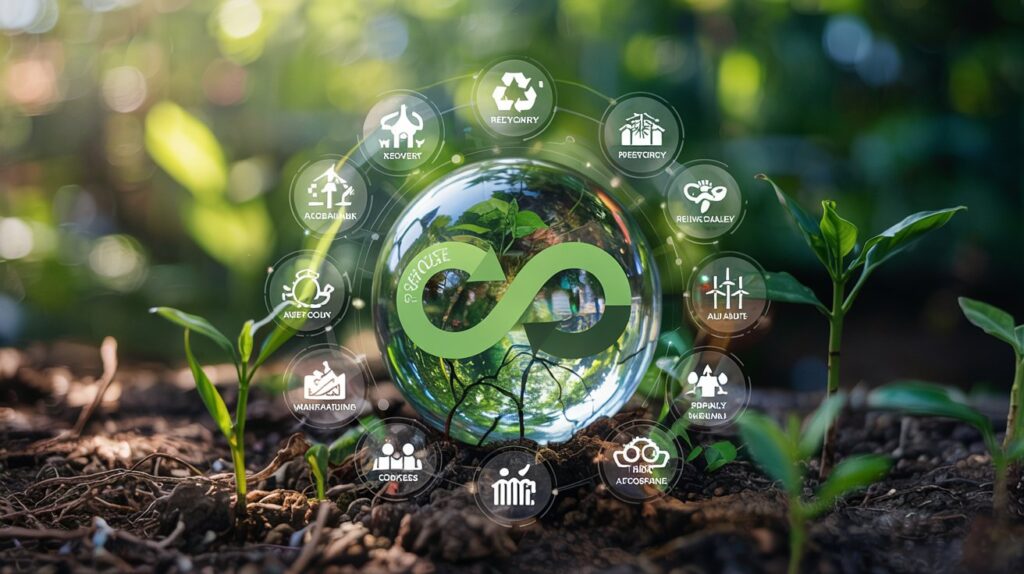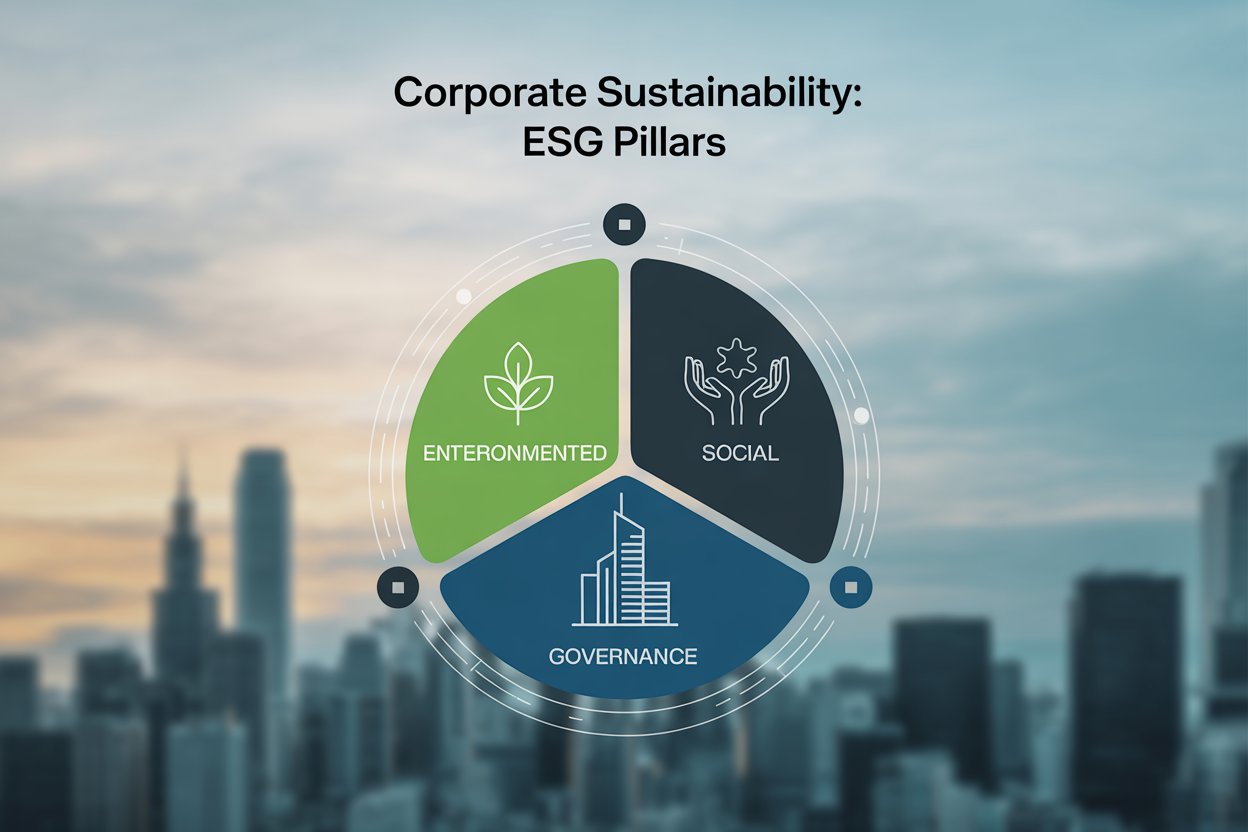Corporate Sustainability: The Future of Business Success
In today’s fast-changing world, businesses can no longer afford to ignore the environmental and social challenges around them. Corporate sustainability is rapidly becoming a core business priority—not just for reputation, but for resilience, innovation, and profitability.
Companies are being called upon to reduce their carbon footprints, support fair labor practices, adopt ethical governance, and create positive change for the planet and society. But this transition is not just about responsibility—it’s also about seizing new opportunities and staying ahead of disruption.
In this comprehensive guide, we’ll explore what corporate sustainability really means, why it matters more than ever, its core ESG pillars, real-life examples of companies that lead the way, and how sustainability consulting and leadership—especially from advisors like Dr. Hishmi Jamil Husain—can help your business thrive.
Table of Contents

What is Corporate Sustainability?
Corporate sustainability is a business model that helps companies achieve long-term growth while positively impacting society and the environment. It moves away from short-term financial performance as the only measure of success and emphasizes sustainable value creation.
Instead of asking, “How much profit can we make?” sustainable companies ask, “How can we make profits without harming people or the planet?”
A solid corporate sustainability strategy aligns economic success with responsible business practices across three key areas: Environmental, Social, and Governance (ESG).
Why is Corporate Sustainability Important?
The demand for sustainable practices has increased due to:
- Climate change and environmental degradation
- Social inequalities and rising employee expectations
- Pressure from investors, consumers, and regulators
- Global goals such as the UN Sustainable Development Goals (SDGs) and net-zero commitments
Businesses that prioritize sustainability not only strengthen their brand and stakeholder relationships but also improve their operational resilience and long-term financial performance.
In this context, sustainability is no longer a PR exercise—it’s a competitive advantage.
Research shows that 73% of global consumers would change their consumption habits to reduce environmental impact.
– Nielsen Global Sustainability Report
Investors, governments, and consumers alike expect businesses to take the lead in building a greener, fairer future. This is driving a paradigm shift across industries, especially in regions like the UAE, which aims to become a global hub for sustainability, innovation, and ESG leadership.
Did You Know?
88% of institutional investors now evaluate a company’s ESG performance before investing.

What Makes Corporate Sustainability Different from Traditional Business Models?
Traditional business models often focus solely on short-term financial gain, sometimes at the expense of environmental or social responsibility. Corporate sustainability, on the other hand, is a long-term, integrated approach that balances profitability with purpose.
A sustainable business:
- Considers its environmental impact before launching new products or projects.
- Cares about how it treats workers across its global supply chain.
- Ensures corporate governance is transparent, ethical, and accountable.
- Innovates products and services that contribute positively to society.
Sustainability is not a department—it’s a mindset that needs to be woven into every layer of the organization, from boardroom decisions to frontline operations.
The Evolution of Corporate Sustainability
Corporate sustainability has evolved over time:
- Phase 1: Philanthropy & CSR
Early sustainability efforts were often limited to donations, sponsorships, or volunteer programs (Corporate Social Responsibility). - Phase 2: Risk Management & Compliance
As environmental and labor laws strengthened, companies began integrating sustainability to avoid legal and reputational risks. - Phase 3: Value Creation & Innovation
Today, sustainability is about creating long-term business value, improving efficiency, meeting stakeholder expectations, and gaining a competitive edge.
In modern businesses, sustainability is tied to data-driven ESG reporting, innovation (such as green tech), and achieving net-zero goals.

Global Drivers of Corporate Sustainability
Several global forces are pushing companies toward sustainability:
- Regulations & ESG Disclosure Requirements
Countries like the UAE, EU, and U.S. are mandating ESG reporting and sustainability disclosures for public and private companies. - UN Sustainable Development Goals (SDGs)
The 17 SDGs act as a universal blueprint for sustainable development. Companies align their strategies with relevant goals, such as climate action, clean energy, or gender equality. - Net-Zero & Climate Agreements
International climate commitments, such as the Paris Agreement, are urging businesses to adopt decarbonization strategies. - Stakeholder Capitalism
Investors, customers, and employees want to see companies creating long-term societal value—not just shareholder profit.
“Sustainability is no longer about doing less harm. It’s about doing more good.” – Jochen Zeitz
“Businesses cannot succeed in societies that fail.” – World Business Council for Sustainable Development
How Sustainability Builds Corporate Intelligence
Sustainability practices help companies build corporate intelligence in the following ways:
- Better understand long-term risks (climate, legal, reputational)
- Use data from ESG metrics to guide decision-making
- Anticipate market shifts and changing consumer behavior
- Optimize resources and minimize waste
- Build stronger supply chains and partnerships
The Three Pillars of Corporate Sustainability: ESG
Corporate sustainability is built upon a robust framework known as ESG—which stands for Environmental, Social, and Governance. These three interconnected pillars provide a comprehensive approach for companies to assess and manage their impact on the world. By focusing on ESG principles, organizations can align profitability with responsibility, future-proof their business, and build long-term value for all stakeholders.
Let’s explore each pillar in detail:

1. Environmental (E)
The environmental pillar focuses on how a company interacts with and affects the natural environment. As climate change, pollution, and resource scarcity become urgent global issues, businesses are under increasing pressure to reduce their ecological footprint.
Key areas under the environmental pillar include:
Carbon emissions and climate impact
Energy efficiency and renewable energy adoption
Waste management and recycling
Water conservation
Sustainable resource use
Biodiversity protection
Companies are expected to monitor, minimize, and report their environmental impact through measurable goals and transparent disclosures. For example, switching to green energy, reducing single-use plastics, and investing in low-carbon technologies are essential steps toward environmental sustainability.
2. Social (S)
The social pillar addresses how a company manages relationships with its employees, customers, suppliers, and the wider community. This aspect of ESG emphasizes human rights, fair labor practices, equity, and community engagement.
Key components of the social pillar include:
Diversity, equity, and inclusion (DEI)
Workplace safety and employee well-being
Fair wages and labor rights
Human rights in the supply chain
Customer satisfaction and data privacy
Community support and social responsibility programs
Companies with strong social practices foster a healthy workplace culture, earn employee loyalty, and contribute positively to society. For instance, implementing fair trade sourcing, supporting mental health initiatives, or engaging in philanthropic efforts reflects social responsibility in action.
3. Governance (G)
The governance pillar focuses on how a company is directed, controlled, and held accountable. It involves the internal systems, practices, and policies that guide corporate behavior and ensure transparency, ethics, and legal compliance.
Key aspects of governance include:
Board structure and independence
Executive compensation and accountability
Anti-corruption and ethical conduct
Shareholder rights and transparency
Compliance with laws and regulations
Risk management and internal controls
Good governance builds investor confidence, mitigates risks, and ensures that sustainability goals are integrated into strategic decision-making. It also aligns leadership behavior with long-term business success and stakeholder expectations.

ESG Metrics and Reporting Tools
To make sustainability measurable and transparent, businesses use various ESG frameworks and standards, including:
- GRI (Global Reporting Initiative)
- SASB (Sustainability Accounting Standards Board)
- CDP (Carbon Disclosure Project)
- TCFD (Task Force on Climate-related Financial Disclosures)
- ISO 14001 (Environmental Management)
- These tools help businesses set KPIs, track progress, and report results to stakeholders, regulators, and investors.
Why ESG Matters
Together, these three pillars form the foundation of any effective corporate sustainability strategy. Companies that embrace ESG principles can enhance their brand reputation, attract investors, manage risks, and drive innovation. ESG is no longer just about compliance—it’s a roadmap for building resilient, responsible, and future-ready businesses.
By integrating ESG into business operations, companies demonstrate a commitment to sustainability that goes beyond words and into measurable action.
Business Benefits of Corporate Sustainability
Adopting sustainability is not just about doing good—it’s also smart business. Here’s how:
Improved Brand Image
Sustainability builds trust with customers, investors, and employees. A reputation for responsible practices enhances loyalty and attracts new markets.
Cost Reduction
Energy efficiency, waste reduction, and leaner processes lead to lower operational costs.
Risk Management
ESG frameworks help companies anticipate and reduce environmental, legal, reputational, and financial risks.
Innovation and Growth
Sustainability fuels innovation—eco-friendly products, circular economy models, and digital tools for ESG reporting open new revenue streams.
Talent Attraction
Top talent today prefers purpose-driven employers. A sustainability-focused brand attracts and retains skilled, motivated employees.
Investment and Financing
Banks and investors now favor ESG-compliant companies. Sustainability-linked loans and green bonds provide better capital access.

Global Leaders in Corporate Sustainability
Let’s look at companies that are putting sustainability into action:
Tata Steel – Leading Sustainability in Heavy Industry
Tata Steel has made corporate sustainability a core business principle, not an add-on. Their strategies include:
- Zero effluent discharge initiatives
- Responsible mining and biodiversity offsets
- Green buildings and energy recovery systems
- Skill development programs for local communities
They also publish detailed ESG disclosures, setting a benchmark in the steel and manufacturing sector.
Unilever – Sustainable Living, Global Impact
Unilever’s “Sustainable Living Plan” integrates sustainability into everything they do, including:
- 100% renewable energy usage in operations
- Ethical sourcing from over 60 countries
- Plastic-free packaging innovations
- Fair wage programs and supply chain transparency
These actions have increased brand equity and built customer trust across markets.
Sustainability Leadership: Dr. Hishmi Jamil Husain
Driving meaningful sustainability transformation requires expert guidance. That’s where global advisor Dr. Hishmi Jamil Husain comes in.
As a renowned expert in biodiversity, corporate sustainability, and ESG integration, Dr. Hishmi brings more than 20 years of strategic experience. Currently the Head of Biodiversity and Corporate Sustainability at Tata Steel, his influence extends far beyond industry boundaries.
Under his leadership, we offer sustainability consulting services that:
- Develop custom corporate sustainability strategies
- Help businesses comply with ESG regulations
- Design biodiversity and nature-based solutions
- Deliver measurable, high-impact ESG outcomes
- Empower UAE businesses to lead the green transition
“With leaders like Dr. Hishmi, sustainability becomes a vehicle for purpose-driven transformation and long-term value creation.”
“Sustainability is no longer an option. It is the foundation of future-ready business.” – Dr. Hishmi Jamil Husain
How to Start Your Corporate Sustainability Journey
Here’s how your business can begin
Conduct a Sustainability Audit
Assess current performance across environmental, social, and governance dimensions.
Define a Corporate Sustainability Strategy
Set clear goals aligned with your industry, operations, and stakeholder expectations.
Engage Stakeholders
Involve employees, suppliers, and community partners to ensure alignment and transparency.
Measure and Report
Track performance with ESG metrics and communicate progress through sustainability reports.
Partner with Experts
Collaborate with experienced sustainability consultants like Dr. Hishmi and our team at Zsustainability to unlock impactful and compliant sustainability pathways.
FAQs – Corporate Sustainability
The primary goal of corporate sustainability is to ensure long-term business success while minimizing negative environmental and social impacts. It involves integrating environmental, social, and governance (ESG) principles into business operations to create value for stakeholders, protect resources, and future-proof the company.
Sustainable practices lead to cost savings through energy efficiency, waste reduction, and resource optimization. In addition, sustainability improves brand reputation, attracts ESG-focused investors, reduces regulatory risks, and opens doors to new markets and customers who value responsible businesses.
No. While large corporations often lead sustainability initiatives, small and medium-sized enterprises (SMEs) also play a vital role. SMEs can benefit from lower operational costs, better stakeholder trust, and increased competitiveness by adopting sustainable practices tailored to their size and resources.
CSR (Corporate Social Responsibility) usually refers to voluntary efforts such as donations or community service, often separate from core business strategy. Corporate sustainability, on the other hand, is a holistic approach that integrates ESG principles into day-to-day business operations, strategy, and decision-making for long-term impact.
Examples include using renewable energy, reducing carbon emissions, ensuring ethical labor practices, implementing diversity and inclusion programs, using sustainable packaging, improving supply chain transparency, and publishing ESG or sustainability reports.
Start with a sustainability or ESG audit to assess current performance. Then, define clear goals aligned with your industry and stakeholder expectations. Engage employees, implement sustainable operations, track progress using ESG metrics, and partner with sustainability experts or consultants like Dr. Hishmi Jamil Husain for strategic guidance.

